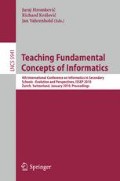Abstract
The "Computer Science, Academia and Industry" extracurricular program has been operating at the Davidson Institute of Science Education for the past few years. The program, designed especially for high-school students majoring in computer science (CS), aims to bridge the gap between schools and the "real world" of computing and provides students with the opportunity to meet with leading computing experts from academia and industry. The program includes a preliminary stage of enrichment meetings and an advanced stage in which students develop software projects. A long-term formative evaluation of the program has been conducted regarding students’ attitudes towards the "different-from-school" style of learning, and their performance in developing projects. This paper describes a specific study aimed at determining how students’ self-appreciation and their initial expectations affect their readiness and aspiration to complete a long-term comprehensive project.
Access this chapter
Tax calculation will be finalised at checkout
Purchases are for personal use only
Preview
Unable to display preview. Download preview PDF.
References
ACM/IEEE Joint Task Force on Computing Curricula, Software Engineering 2004 Curriculum Guidelines for Undergraduate Degree Programs in Software Engineering, A Volume of the Computing Curricula Series (August 2004)
The Ministry of Education, Israel, A high-school Software Engineering program (2004), http://csit.org.il (in Hebrew)
Bracken, B.: Progressing from student to professional: the importance and challenges of teaching software engineering. JCSC 19(2), 358–368 (2003)
Fincher, S., Petre, M., Clark, M. (eds.): Computer Science Project Work Principles and Pragmatics. Springer, London (2001)
Gal-Ezer, J., Beeri, C., Harel, D., Yehudai, A.: A high-school program in computer science. Computer 28(10), 73–80 (1995)
Gal-Ezer, J., Zeldes, A.: Teaching software designing skills. Computer Science Education 10(1), 25–38 (2000)
Haberman, B., Yehezkel, C.: Computer science, academia & industry – An educational program for establishing an entry point to the computing community of practice. J. Infomation Technology Education 7, 81–100 (2008)
Haberman, B., Yehezkel, C., Salzer, H.: Making the computing professional domain more attractive: an outreach program for prospective students. Int. Journal of Engineering Education 25(3), 534–546 (2009)
Haberman, B., Yehezkel, C.: Long-Term Software Projects Development – The Affect of Students’ Self-Appreciation and Initial Expectations. In: ITiCSE 2009, Paris, France, p. 363 (2009)
Holcombe, M., Stratton, A., Fincher, S., Griffiths, G. (eds.): Projects in the computing curriculum. Proceedings of the Project 1998 Workshop. Springer, London (1998)
Long, P.D., Ehrmann, S.C.: Future of the learning space: Breaking out of the box. Educause, 42–58 (2005)
Passig, D.: Taxonomy of IT future thinking skills. In: Tailor, H., Hogenbirk, P. (eds.) Information and Communication Technologies in Education: The School of the Future, pp. 152–166. Kluwer Academic Publishers, Boston (2001)
Pollack, S., Scherz, Z.: Supporting project development in CS – the effect on intrinsic and extrinsic motivation. In: Proceedings of the 10th PEG Conference, Tampere, Finland, pp. 143–148 (2005)
Scherz, Z., Pollack, S.: An organizer for project-based learning and instruction in computer science. In: ITiCSE 1999 Conference, Cracow, Poland, pp. 88–90 (1999)
Sims-Knight, J.E., Upchurch, R.L.: Teaching software design: a new approach to high school computer science. In: Annual Meeting of the American Education Research Association, Atlanta, GA (April 1993), http://www2.umassd.edu/CISW3/people/faculty/rupchurch/papers/aera.pdf (last retrieved 26/10/09 )
Yehezkel, C., Haberman, B.: Bridging the gap between school computing and the “Real world”. In: Mittermeir, R.T. (ed.) ISSEP 2006. LNCS, vol. 4226, pp. 38–47. Springer, Heidelberg (2006)
Author information
Authors and Affiliations
Editor information
Editors and Affiliations
Rights and permissions
Copyright information
© 2010 Springer-Verlag Berlin Heidelberg
About this paper
Cite this paper
Yehezkel, C., Haberman, B. (2010). Long-Term Development of Software Projects – Students’ Self-appreciation and Expectations. In: Hromkovič, J., Královič, R., Vahrenhold, J. (eds) Teaching Fundamentals Concepts of Informatics. ISSEP 2010. Lecture Notes in Computer Science, vol 5941. Springer, Berlin, Heidelberg. https://doi.org/10.1007/978-3-642-11376-5_18
Download citation
DOI: https://doi.org/10.1007/978-3-642-11376-5_18
Publisher Name: Springer, Berlin, Heidelberg
Print ISBN: 978-3-642-11375-8
Online ISBN: 978-3-642-11376-5
eBook Packages: Computer ScienceComputer Science (R0)

